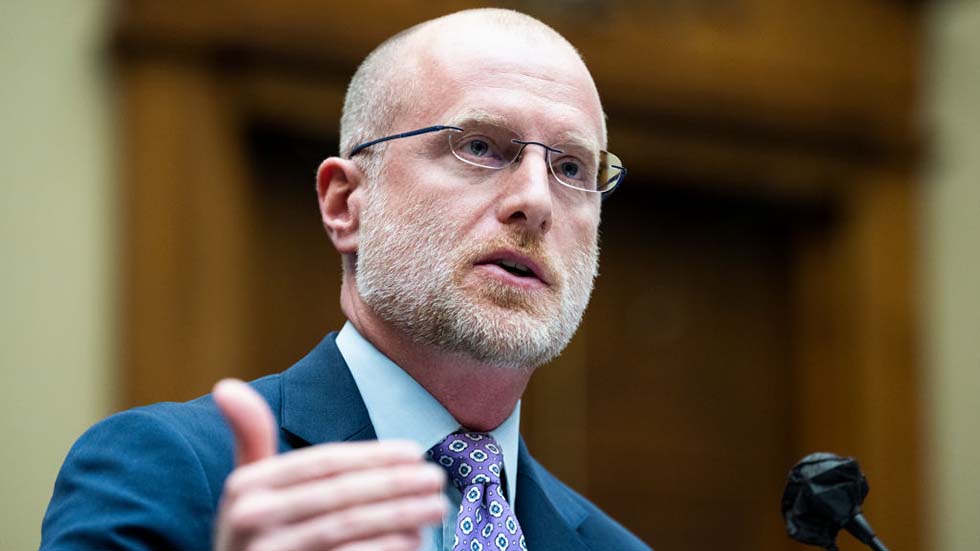FCC’s Brendan Carr, House GOP Tag-Team Title II Pushback
Republicans are on same page in opposition to Democrats’ net-neutrality rulemaking

The smarter way to stay on top of broadcasting and cable industry. Sign up below
You are now subscribed
Your newsletter sign-up was successful
House Energy & Commerce Committee Republicans and FCC GOP member Brendan Carr are singing from the same hymnal when it comes to the FCC Democratic majority’s plan to launch a notice of proposed rulemaking (NPRM) restoring network neutrality rules rejected by the previous Republican-led FCC.
The headline on an October 17 press release from all the E&C Republicans proclaimed: “E&C GOP to Rosenworcel: The Net Neutrality Debate was Settled When the Internet Didn’t Break.”
The release was announcing a letter those members had sent to Federal Communications Commission chair Jessica Rosenworcel counting the ways the FCC would be wrong to restore the rules and reclassify broadband as a Title II telecommunications service subject to FCC open access and other regulations.
Enter Carr, whose October 18 statement was headlined: “The Title II Debate Was Settled When the Internet Didn’t Break.” He also posted a copy of the GOP House members’ letter to the social-media platform X (formerly Twitter), endorsing it.
The Title II debate was settled when the Internet didn’t break.Since 2017:✅ Mobile speeds are up 6X✅ Prices are down✅ Competition has intensified✅ Digital divide has narrowedTitle II is nothing more than government control in sheep’s clothing.… pic.twitter.com/uBphhqipPrOctober 18, 2023
Both the letter and Carr’s statement argue that under the light-touch — or, as Democrats would say, essentially “no touch” — regulation of Title I, broadband networks have thrived, investment has increased (as has competition) and the real cost of the service has gone down.
“[U]tility-style regulation of the Internet was never about improving your online experience — that was just the sheep’s clothing,” Carr said. “It was always about government control. So no matter what you hear tomorrow and beyond, the Internet is not broken and the FCC does not need Title II to fix it.”
Also Read: NCTA Chief Michael Powell Kicks Off Cable’s Latest Rhetorical Assault on Net Neutrality
The smarter way to stay on top of broadcasting and cable industry. Sign up below
House Republicans agreed: “Despite constant fear-mongering, this debate was settled in 2017 when the Internet didn't break following the repeal of heavy-handed FCC regulations,” House E&C chair Cathy McMorris Rodgers (R-Wash.) and Communications Subcommittee chair Bob Latta (R-Ohio) said.
In their letter, the legislators sought a raft of answers from Rosenworcel on everything from who participated in drafting the NRPM, to whether it was discussed with the White House to whether the FCC has ever received any complaints about the blocking, throttling and paid prioritization that the rules are meant to prevent, and if so from whom.
They also want assurances the FCC will hold to its pledge not to regulate rates. That means rate regulation in any way, shape or form, Republicans said, either before or after the fact.
The Republican-saber rattling notwithstanding, the Democratic FCC majority will almost certainly vote on October 19 to launch a rulemaking to reclassify internet access as a Title II service subject to FCC regulation and restore rules against blocking, throttling and paid prioritization, as well as reinstate a “general conduct standard” allowing the agency to regulate conduct not specifically falling under those headings.
Contributing editor John Eggerton has been an editor and/or writer on media regulation, legislation and policy for over four decades, including covering the FCC, FTC, Congress, the major media trade associations, and the federal courts. In addition to Multichannel News and Broadcasting + Cable, his work has appeared in Radio World, TV Technology, TV Fax, This Week in Consumer Electronics, Variety and the Encyclopedia Britannica.

